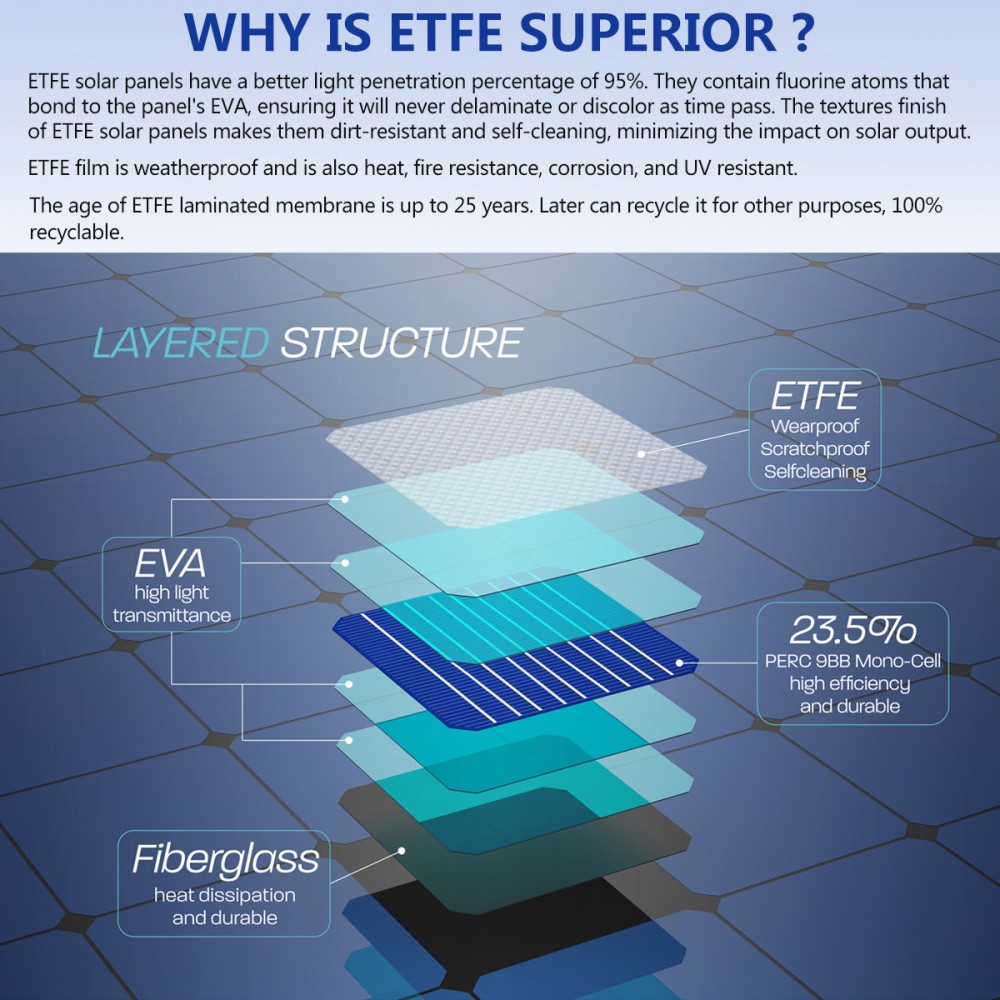FAQs
Our Flexible solar panels have two years installation/workmanship warranty, the product carries a one year warranty.
Solar cells are guaranteed to produce at least 90% of nominal power in 10 years and 80% of nominal power in 25 years.
Vehicle Solar Australia was established in 2021. We are a supplier of high-performance solar power products, flexible solar panels, vehicle specific solar panels and solar controllers.
Our products are produced using the latest in solar technology where the panels are made using laser cutting machines, Non-Pb soldering lines, module testing machines, laminating machines and so on. Manufactured using only top-quality solar materials. Our experienced staff work together well to assure quality under effective ISO quality management system.

The items are shipped from our Malaga warehouse in Perth, Western Australia.
These panels use the latest PERC Monocrystalline grade A solar cell, with 22-23% efficiency. Click here to learn more.
12V system solar panel(rated voltage 18v)–12V regulator–12V battery
24V system solar panel(rated voltage 36v)– 24V regulator–24V battery
You can connect two or more 12v system solar panels in parallel into 12v system or in series into 24v system.
Yes, although they produce less electricity. Under a light overcast sky, panels might produce about half as much as under full sun.
Because of the wiring design of a solar module, all of the individual solar cells on a module must receive full sunlight for the module to work properly. If any portion of the module is shaded, the entire module power output-even those sections still exposed to sunlight-is lowered.
The size of solar system you need depends on several factors such as how much electricity you use and the size of your bonnet/roof. Also, do you want the system to supply your complete energy usage or to supply a portion of your higher cost energy usage? You can contact a system designer/installer to determine what type of system would suit your needs.
The VSS panels can be mounted in 2 ways –
- Using 3M VHB double sided tape, approximately 25mm wide is recommended. Install as per this installation guide.
- Using a high bond structural adhesive such as Sika-flex 252 or liquid nails or similar
Installing a VSS panel onto a vehicle’s roof
Although, our solar panels are built tough and rigorously tested, we cannot recommend walking on these panels as this might result in internal damage to the solar cells and soldering.
Once installed the VSS system is not designated to be removed from the vehicle. The solar panel can be removed only if absolutely necessary. i.e., the panel needs to be replaced.
The MPPT charge controller included in our complete kits are programmed to charge a wide variety of battery types. Our system will work with AGM, Lead-Acid and Gel Cell Type Batteries.
*we do not recommend the use of Optima Batteries with the VSS system.
This is the most commonly asked question about our VSS System. It is a fact that solar cells lose efficiency as they warm up, however the simple answer is NO, engine heat will not have an effect on how the VSS system operates.
Why you ask? Well, the main benefit of the VSS system is that it provides power to your vehicle battery when the engine is NOT running (and therefore not hot). When the engine is running (and hot) the vehicle’s alternator is doing the majority of the charging and not the solar panel. This means there is very little effect from the additional heat on the system when the system is used for its intended benefits.
In order to help with the heat build-up, each VSS panel is prepped with closed cell neoprene on the back of the panel. This serves two purposes; it lifts the panel up off of the hood creating an air packet between the panel and the hood allowing for cooling, while also helping to protect the vehicle hood from any contact with the back of the panel.
PWM and MPPT controllers have their own unique advantages and disadvantages:
- Price: The MPPT controller is more expensive than PWM controller, however, the MPPT controller has higher charging efficiency, especially in colder weather conditions. The MPPT controller also supports more photovoltaic (PV) panels wired together in series (high voltage difference), which is another big advantage. In this case, the cross-sectional area of the connecting cable can be greatly reduced, thus reducing the overall cost of the system.
- Efficiency: The PWM charging controller cannot charge the maximum power generated by the photovoltaic (PV) array. Its overall efficiency is usually between 65-85%. On the other hand, the MPPT controller will ensure that the solar array is always in the best running state. In some cases, such as cold weather, the MPPT controller provides a 30% higher charging efficiency than PWM (high charging efficiency).
- PWM technology is mature, the circuit is simple and reliable, the price is cheap but the utilization rate of components is low, it is more suited for the small systems, the temperature range of the solar charging unit is 45-75℃.
The MPPT controller is a better choice for larger system, its higher efficiency means good economic benefit. In addition, the MPPT controller enables the user to obtain maximum power from the photovoltaic (PV) array, which is a significant advantage in situations where additional power needs exist and the space is limited to allow for the expansion of the PV array size.
In short, YES. At VSS we have numerous shapes and sizes to choose from and we can customer design panels for virtually an application. In most instances, our existing range of panels will suit numerous environments.
Yes, it adds to the protection of the vehicle’s paintwork and if you ever need to remove this will help.
Please contact us as we will come up with a Solar Solution for your Vehicle, Caravan, Camper or Roof Topper.

